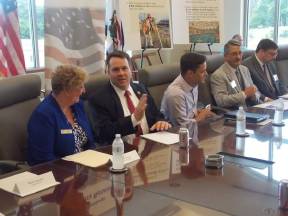By John McVey
The Journal

MARTINSBURG, W.Va. — Local banks that are members of the Federal Home Loan Bank of Pittsburgh would make home loans to low-income families if they could find low-income families who could afford a home.
“That’s the challenge – we have a limited area in which to invest – it’s hard to find qualified low-income customers in this environment,” David Langford, of United Bank, said Monday during a FHLBank Pittsburgh roundtable discussion with U.S. Rep. Alex X. Mooney, R-W.Va, which was hosted by Blue Ridge Community and Technical College.
According to Langford, Ranson is the only place in the tri-county region that qualifies for the federal low- income classification.
To be classified as low-income and qualify for the FHLBank Pittsburgh’s Affordable Housing Program, a family of four’s yearly income cannot exceed $26,000. The yearly payment on an entry-level home is about $9,300, or about 36 percent of that family’s annual income.
Members of the roundtable felt that would make it very hard for that family to afford a house.
FHLBank Pittsburgh is one of eleven FHLBanks nationwide, according to its website. Congress created this national network of privately owned wholesale banks in 1932 to ensure available funding for mortgages. It is a cooperative of members that own stock in the bank.
The FHLBank Pittsburgh provides readily available low-cost funding and opportunities for affordable housing and community development to 302 member financial institutions in Delaware, Pennsylvania and West Virginia, according to its website. It ensures the availability of funds for housing. It held about $87.4 billion in assets as of March 31.
About 10 percent of FHLBank Pittsburgh’s net income is set aside annually for its Affordable Housing Program, which was created by Congress in 1989 to help fill the gap in funding for affordable housing.
Since 1990, FHLBank Pittsburgh has awarded about $14.7 million in Affordable Housing Program grants, supporting about 1,700 housing units for low- or very low-income households in West Virginia.
FHLBank Pittsburgh also offers the First Front Door program which matches $3 for every $1 a qualified, first-time homebuyer contributes – up to $5,000 – for the down payment and closing costs of a home.
Dave W. Buches, community investment manager for FHLBank Pittsburgh, said it is challenging to find qualified buyers for the First Front Door program, also.
“We have the program, but we can’t find buyers,” he said Monday. “We have to work to position buyers so they qualify for the program.”
In West Virginia, there are 62 community banks and credit unions that are members of FHLBank Pittsburgh, including United Bank, the Bank of Charles Town, Capon Valley Bank, CNB Bank and Jefferson Security Bank.
The gathering was part of a series of affordable housing and economic development roundtables held this year.
“Members are struggling with regulations,” Peter E. Knight, FHLBank Pittsburgh’s director of government relations, told Mooney. “With the Dodd-Frank Act, it is harder to get credit to people. We need to get a better handle on regulations and let banks do their job. We need bipartisan consensus on regulations.”
The DoddFrank Wall Street Reform and Consumer Protection Act was passed by Congress and signed into law in 2010 in response to the Great Recession. It established new regulations on lending.
Some critics say the regulations are too restrictive, especially for community banks. Critics say that Dodd- Frank hamstrings community banks’ ability to make loans to homebuyers and small businesses because the qualifications are too strict.
“I got the clear sense that the regulations have caused adverse effects for folks who want to provide loans to people who want to buy homes,” Mooney said after the roundtable discussion. “It’s easy in theory to pass regulations that are intended to be helpful, but prevent people from getting loans. We need to repeal what needs to be repealed and modify what needs to be modified. I expect we’ll revisit it, and I expect it will be bipartisan. We can agree to help people.”
Mooney represents the 2nd Congressional district of West Virginia, which includes Berkeley, Jefferson and Morgan counties.. Also on Monday, he toured Craftworks at Cool Spring in Charles Town, Valley College in Martinsburg and James Rumsey Technical Institute in Hedgesville Monday.
—
Staff writer John McVey can be reached at 304-263-3381, ext. 128, or twitter.com/jmcveyJN.






